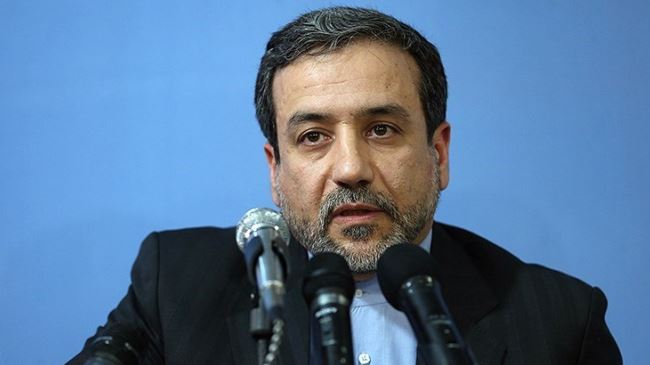Senior Iranian nuclear negotiator Abbas Araghchi tells Press TV that no progress has yet been achieved in trilateral talks between Iran, the US, and the EU over Tehran’s nuclear energy program.
Speaking to Press TV correspondent on Monday, Araghchi said negotiations in the Omani capital, Muscat, were useful, however, no headway was made.
He said the sides are now “working on solutions” after months of talks on different subjects, adding that the Iranian side believes that “negotiations in the past two days and discussions were very useful. But we are not still in a position to say that we have made progress. It’s yet to be done in the coming days. We would be available as much as needed here in Oman or in any other place before the November 24 deadline. We are still hopeful.”
The top negotiator noted that a lot of work has remained to be done and more expert-level and bilateral meetings are required.
Araghchi added that the process of striking a comprehensive deal on Iran’s nuclear energy program needs “lots of goodwill by all parties and of course readiness to make difficult decisions.”
On Monday, Iranian Foreign Minister Mohammad Javad Zarif, US Secretary of State John Kerry and EU negotiator, Catherine Ashton, wrapped up two days of discussions.
They were due to hold a joint press conference following the talks. However, it was canceled with no clear breakthrough in the discussions.
Araghchi further described the issue of uranium enrichment as a “key question” for the other side and the lifting of sanctions slapped on Iran as a “very important key question” for Tehran.
Referring to different aspects of sanctions, Araghchi said the sides have to find a solution about “how and when these sanctions are removed.”
“It’s a fact that based on a possible comprehensive solution all the sanctions should be lifted,” he said, expressing hope that the negotiating sides could find a settlement to the issue of enrichment.
“Iran would certainly continue its enrichment, but the question is the capacity of this enrichment which should be determined based on our practical needs and that would be something we are very hopeful to come to at the end of these negotiations.”
The US State Department spokeswoman, meanwhile, said the talks were “tough, direct and serious.” Jen Psaki told reporters in Washington that the US remained focused on making progress, and there’s still time to do so.
In response to a question about the political will on the part of the US to find a resolution to the dispute over Iran’s nuclear activities, Araghchi said that the other side, including Washington, apparently has “enough seriousness” and shows “political will and determination.”
“We have seen political determination in all parties in P5+1, but how these political determination or political will is translated into those difficult decisions that the other side should make [is] yet to be seen.”
The negotiations were aimed at facilitating a final deal over Iran’s nuclear energy program before the November 24 deadline.
The extent of Iran’s uranium enrichment as well as a timetable for the removal of US and EU sanctions were high on the agenda of the Oman negotiations.
Representatives of Iran and the five permanent members of the UN Security Council – Russia, China, France, Britain and the US – plus Germany will hold further talks at deputy level on Tuesday.
